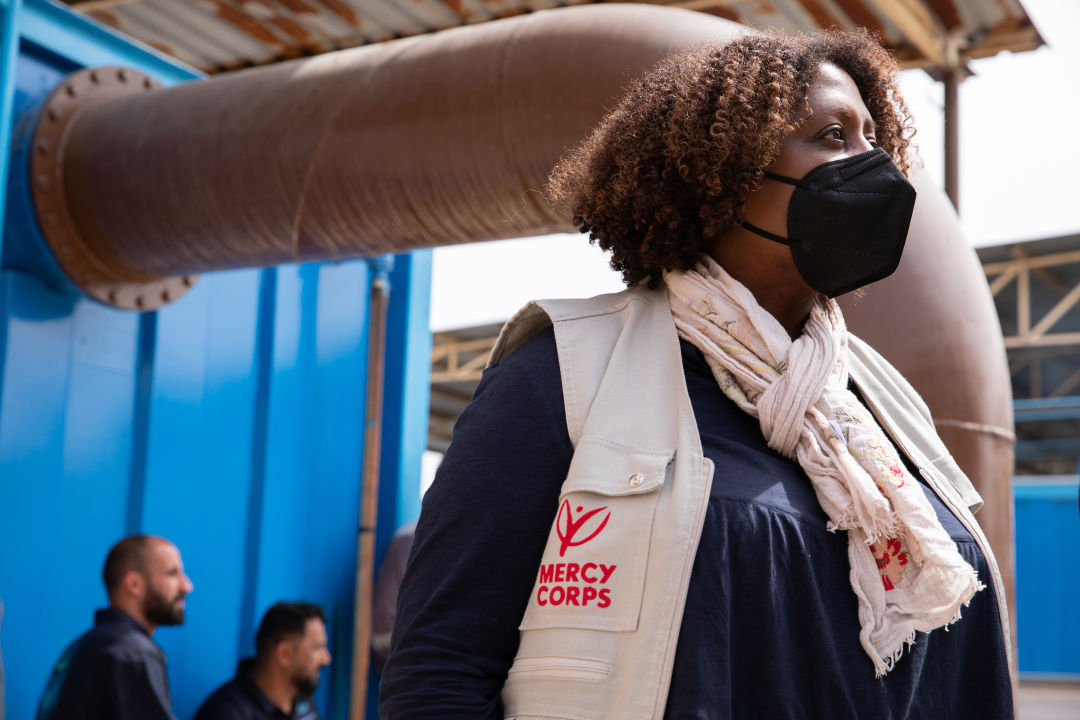
Weeks after the city’s first rallies for Ukraine, Seattle still lights up blue and yellow at night. And rightfully so. With thousands of Ukrainians dead and as many as 10 million displaced because of Russian violence, the European nation can use all the support it can get right now. Many local organizations have stepped up to provide more material forms of aid.
But the outpouring for a humanitarian crisis in Europe has also underscored how little attention similarly dire crises in other parts of the world receive here—and how the war worsens them. “It has consumed me,” says Tjada D’Oyen McKenna, CEO of PNW-based aid organization Mercy Corps.
D’Oyen McKenna, who took over an organization in its own turmoil back in 2020, recently returned from a trip that reinforced these uncomfortable truths of aid work. Her two-and-a-half-week journey started at the border of Poland and Ukraine. Forced conscription meant few men were on the ground. “It's really startling to see a crowd that's basically all women and children.” Some were “dazed and confused,” having traveled longer distances to the area from eastern Ukraine as threats intensified there. Many just wondered when they could return to their homes.
Mercy Corps works with local groups in Poland and Ukraine to meet needs in the meantime—supplies might include flour, oil, rice, sugar, buckwheat, baby food, and medicine—but concerns about human trafficking and psychosocial support remain, D’Oyen McKenna says. “You'd see people getting off the trains coming across the border, and you saw support being rushed to some and others being ignored.” With the backing of Mercy Corps, a Polish organization is providing shelter and services for third country nationals—primarily Africans and Romanis—who might get lost in the shuffle.
D’Oyen McKenna’s travels didn’t end in Europe, though. During visits to Iraq and Lebanon, she saw firsthand how the plight of Ukraine—a “breadbasket”—affected food systems around the globe, where prices are at a record high. Lebanon receives 80 percent of its wheat supplies from the country. “Where in the U.S. we are seeing rising gas prices,” she says, “in Lebanon, that translates to empty shelves or a loaf of bread that's so unaffordable.”
Africa also leans heavily on Russia and Ukraine for these crops, which has exacerbated an existing crisis felt acutely in Seattle: Amid the worst drought in decades, an estimated 13 million people in the Horn of Africa region—where our city’s robust Somali, Ethiopian, and Eritrean communities still have many loved ones—were food insecure. And that was before the violence broke out in Europe and supplies stopped flowing south.
The rising costs have real consequences. Mercy Corps distributes food for the World Food Programme, which has had to halve assistance for four people. “You have mothers, who tend to live in multigenerational households, trying to figure out how to feed families of four, six, eight people on those rations.”
D’Oyen McKenna knows that the nuclear question hanging over the war in Ukraine contributes to the extra attention it receives. But she hopes the laser-focus on a European war will highlight the inequity in responses to other problems and inspire more in the U.S. to donate widely (cash is better than goods, she advises).
She draws her optimism in part from her time at the Gates Foundation over a decade ago—"employee number 200-something”—and its insistence that crises are solvable. She also gleaned how problems were global, not local.
In Lebanon, for instance, she met with Syrian refugees from Raqqa who were once doctors and dentists and university students. Now they were grateful to have agricultural work while their families were living in tents. It was like a replay of the conversations she’d had in Ukraine days earlier with many middle class families now forced to question their prospects. “My hope is that, out of this, people will really come to understand the universality of this,” says D’Oyen McKenna. “And to know that it could happen anywhere.”
"flow" - Google News
April 18, 2022 at 11:15PM
https://ift.tt/DpW3dPF
Why Seattle Donations Should Flow from Ukraine to Somalia and Beyond - Seattle Met
"flow" - Google News
https://ift.tt/lmouQqF
https://ift.tt/rEj0xeR
Bagikan Berita Ini














0 Response to "Why Seattle Donations Should Flow from Ukraine to Somalia and Beyond - Seattle Met"
Post a Comment